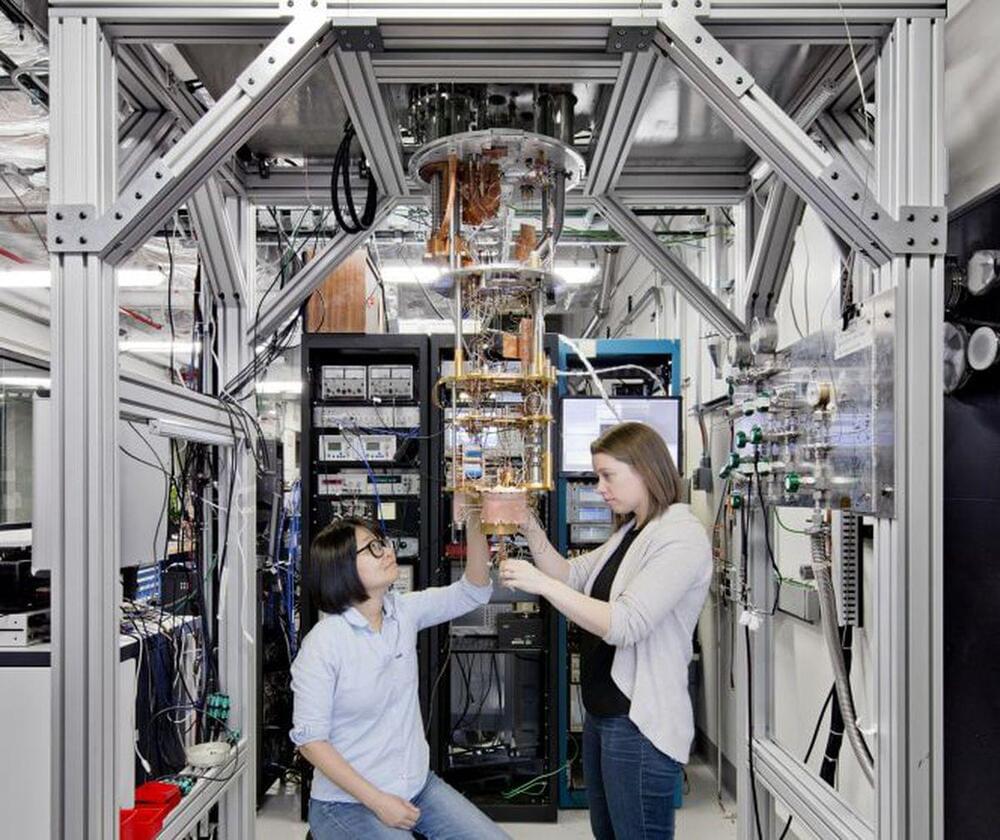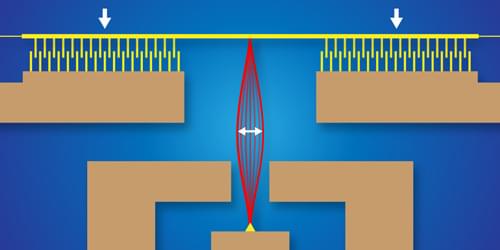This content was paid for by HSBC. The newsroom was not involved in the creation of this content.



A type 5 civilization often seen as unattainable is actually quite possible. We could have computers to use a developer mode to solve all sorts of problems like the entropy of the universe and even stop the entropy of the earth or stop meteorites from hitting earth with a computer click. This could easily be attainable with technological singularities leading to a new understanding of our universe but should be considered to essentially stop almost any problem to earth and beyond.
Type 1 civilization designation on the Kardashev scale may be possible in the next 100 years, which could influence the survival of mankind.


An electromechanical device allows researchers to control and study how a nanoscale beam buckles when compressed.
The buckling of a column or other structural element is typically something that engineers want to avoid, but a new device offers a way to control this type of deformation on microscopic scales. The design combines small actuators and circuits that generate mechanical and electrostatic forces on a nanoscale beam, causing it to buckle to the left or to the right. By manipulating the beam’s deformation, researchers may be able to harness buckling for sensitive detectors or for testing the relationship between thermodynamics and computing.

To improve access to large data sets, scientists are looking to cloud-based solutions for data management.
In the coming decade, big projects like the Large Hadron Collider (LHC) and the Square Kilometre Array (SKA) are each expected to produce an exabyte of data yearly, which is about 20 times the digital content of all the written works throughout human history. This information overload requires new thinking about data management, which is why scientists have begun to look to the “cloud.” In such a scenario, data would be stored and analyzed remotely, with the advantage that information would become more accessible to a wider scientific community. Efforts are underway to create “science clouds,” but disagreements remain over their structure and implementation. To discuss these details, around 60 scientists came together for The Science Cloud meeting in Bad Honnef, Germany. The attendees shared lessons from past and ongoing projects in the hope of building the groundwork for a future scientific computing infrastructure.

In the ’80s, the spy agency investigated the “Gateway Experience” technique to alter consciousness and ultimately escape spacetime. Here is everything you need to know.
She turned to me the other morning and said, “You heard of The Gateway?” It didn’t register in the moment. She continued, “It’s blowing up on TikTok.” Later on, she elaborated: It was not in fact the ill-fated ’90s computer hardware company folks were freaking out about. No, they’ve gone further back in time, to find a true treasure of functional media.
The intrigue revolves around a classified 1983 CIA report on a technique called the Gateway Experience, which is a training system designed to focus brainwave output to alter consciousness and ultimately escape the restrictions of time and space. The CIA was interested in all sorts of psychic research at the time, including the theory and applications of remote viewing, which is when someone views real events with only the power of their mind. The documents have since been declassified and are available to view.

For nearly 40 years, materials called ‘strange metals’ have flummoxed quantum physicists, defying explanation by operating outside the normal rules of electricity.
Now research led by Aavishkar Patel of the Flatiron Institute’s Center for Computational Quantum Physics (CCQ) in New York City has identified, at long last, a mechanism that explains the characteristic properties of strange metals.
In the August 18 issue of Science, Patel and his colleagues present their universal theory of why strange metals are so weird—a solution to one of the greatest unsolved problems in condensed matter physics.

Dr. Michio Kaku, the renowned theoretical physicist, walks us through the evolutionary journey of computing, from analog to digital to the quantum era.
Quantum computers hold immense promise because of their ability to tap into the weirdness of quantum mechanics. If nature allows us full access to its secrets, we could boost computing power exponentially, which in turn would allow us to solve all types of complex problems.
The National Institute of Allergy and Infectious Diseases (NIAID), one of the largest institutes in the National Institutes of Health (NIH), part of the Department of Health and Human Services (HHS), conducts and supports basic and applied research to better understand, treat, and ultimately prevent infectious, immunologic, and allergic diseases. The Bacterial Pathogenesis and Antimicrobial Resistance Unit (chief John Dekker) in the Laboratory of Clinical Immunology and Microbiology in the Division of Intramural Research (DIR) within NIAID seeks candidates for a postdoctoral fellowship position in microbial genomics.
This position will offer a unique opportunity to work at the intersection of pathogen genomics, systems biology, and clinical infectious diseases. The lab uses a variety of genomics, transcriptomics, metabolomics, imaging, and molecular approaches to study bacterial pathogens and antimicrobial resistance, with a focus on intra-host evolution in the context of infection. Access to state-of-the-art short-and long-read sequencing, metabolomics, optical, and computational resources is available. See more information about the Bacterial Pathogenesis and Antimicrobial Resistance Unit under chief John P. Dekker and an example of their recent work.

Brain-computer interfaces are devices that allow for direct communication between the brain and external devices, such as computers or prosthetics. As significant investments flow into R&D, cutting-edge companies are gearing up for human trials. These trials aim to showcase and fine-tune the potential of these interfaces to treat conditions such as Parkinson’s disease, epilepsy and depression.
While these technologies’ immediate use is for treating conditions, they also have the potential to access vast information at unprecedented speeds. As it stands today, the field not only aims to aid recovery, but also enhance existing cognitive functions. These goals introduce various ethical and… More.
Can cutting-edge technology transform the way humans learn, remember and evolve?